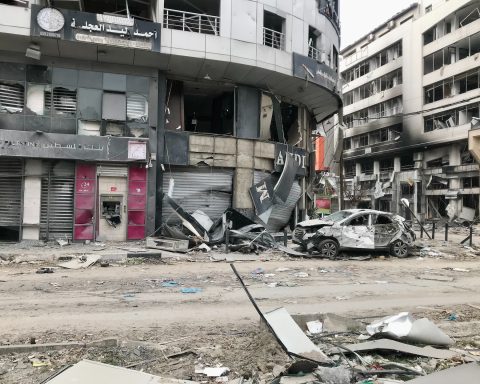Ben Bowers is a Community Palliative Care Nurse, NIHR School for Primary Care Research PhD Student, PhD student and Queen’s Nurse, Primary Care Unit, Department of Public Health and Primary Care, University of Cambridge. He is on Twitter: @Ben_Bowers__
Kristian Pollock is Professor of Medical Sociology, Nottingham Centre for the Advancement of Research into Supportive, Palliative and End of Life Care, School of Health Sciences, University of Nottingham.
Roberta Lovick is a Public Contributor and family caregiver, Primary Care Unit, Department of Public Health and Primary Care, University of Cambridge.
Bárbara Antunes is a Research Associate, Primary Care Unit, Department of Public Health and Primary Care, University of Cambridge.
Irene J Higginson is Professor of Palliative Care and Policy, Cicely Saunders Institute of Palliative Care, Policy & Rehabilitation, King’s College London.
Stephen Barclay is a General Practitioner and Senior Lecturer in General Practice and Palliative Care. Primary Care Unit, Department of Public Health and Primary Care, University of Cambridge.
Corresponding author: Ben Bowers.
Community palliative care delivery is changing dramatically in response to the Covid-19 pandemic, especially in several of the worst affected countries.1,2 In the UK, phone and video end-of-life consultations have been widely adopted by GPs and palliative care teams alongside ‘virtual’ care home ward rounds, nurse verification of death and remote death verification and after-death care.2,3 Prescribing of end-of-life-care drugs is changing: family caregivers are being encouraged to assume greater involvement in administering medicines, including giving injections. This is a big ask, even when they are well supported and feel able to do so.2 Care has been radically overhauled in anticipation of a rapid rise in demand for community end of life care that may well materialise during the coming months.4
These new ways of working can be empowering for staff, increasing efficiency; they can also enable patients to have more timely access to care with reduced infection risks. Virtual GP consultations are enabling greater access to medical reviews. However, community nurses and care home nurses, who deliver a large proportion of end-of-life care, report that they miss the support they previously experienced from GP visits in person. Reduced visits from GPs and community nurses are placing greater reliance on informal family caregivers and paid carers.5 The pandemic has reinforced the need for effectively integrated health and social care. The consequences for family caregivers remain to be seen, but even before the pandemic the capacity of the informal sector to absorb increased responsibility for care had been called into question.
The evidence-base on how to deliver community palliative care during pandemics is virtually non-existent, beyond recognition of the need for more end of life care and the greater emotional strain on everyone involved.4 Technologies and different types of clinical contact shape care and experiences in ways that may be unintended and unanticipated.6 Necessity has forced rapid innovation, but we must be alert to negative, as well as positive, consequences of the changes made. New ways of working may exacerbate inequalities in access to care, particularly for people who are not confident with mobile phones and computers, and patients experiencing communication difficulties.5 Some patients and informal caregivers we have spoken to in the course of our recent research have valued the direct and responsive access available through remote consultations. Others have reported that they are missing the previous face-to-face consultations that made them feel well supported during their final period of life.
Despite the NHS principle of person-centred care, patients and informal caregivers have had little say in these rapid changes and currently often have limited choice about the way their care is delivered. Many patients are making allowances for the constraints placed on care provision during these extraordinary times and are grateful for the efforts to reduce their risk of infection. During the initial stages of the pandemic, people were reluctant to access services, in part to ease perceived pressures on the NHS. Now there are reports in the media that patients are increasingly requesting care, and that some are finding it difficult to navigate the new care systems that have come into place during the pandemic.7
Many of these new ways of working will have had time to be embedded in practice by the end of the Covid-19 pandemic. Some will help healthcare services to adapt to meet the population’s increasing long-term palliative care needs when resources are constrained. A recent UK survey found 88% of GPs plan to continue providing remote patient consultations beyond the pandemic.3 How GPs and community nurses feel about recent changes in palliative and end-of-life care practice remain to be seen. There is a danger that decisions resulting from policies and resource constraints will be prioritised over patient preferences when planning future services and access to care beyond the pandemic. Without public contributions in evaluating the impact of changes in practice, care may become increasingly system-centred rather than person-centred.
Before we decide what changes to embrace now and to put into place in the long-term future, we need to ask patients and informal caregivers about their experiences and preferences for care. Now is the time to ask them what new ways of working are helpful or unhelpful, and their experiences of their unintended and unforeseen consequences.
References
1. Costantini M, Sleeman KE, Peruselli C, Higginson IJ. Response and role of palliative care during the COVID-19 pandemic: A national telephone survey of hospices in Italy. Palliative Medicine, 2020; 4(7), 889–895. https://doi.org/10.1177/0269216320920780
2. Antunes B, Bowers B, Winterburn I, et al. Anticipatory prescribing in community end-of-life care in the UK and Ireland during the COVID-19 pandemic: online survey. BMJ Support Palliat Care, 2020; Published Online First. doi:10.1136/bmjspcare-2020-002394
3. Kasaraneni K. Can general practice learn from the COVID-19 global pandemic? 4 June 2020
https://www.bma.org.uk/news-and-opinion/can-general-practice-learn-from-the-covid-19-global-pandemic
4. Mitchell S, Maynard V, Lyons V, Jones N, Gardiner C. The role and response of primary care and community nursing in the delivery of palliative care in epidemics and pandemics: a rapid review to inform practice and service delivery during the COVID-19 pandemic. Oxford: Centre for Evidence-based Medicine. 4 June 2020 https://www.cebm.net/covid-19/primary-carw-and-community-nursing/
5. Johnson H, Brighton LJ, Clark J, et al. Experiences, concerns, and priorities for palliative care research during the COVID-19 pandemic: A rapid virtual stakeholder consultation with people affected by serious illness in England. London: King’s College. June 2020 https://doi.org/10.18742/pub01-034
6. Mol, A. The logic of care: health and the problem of patient choice. Abingdon, Oxon: Routledge, 2008
7. Lamb C. the silent cost of the coronavirus: NHS cancer delays, cancelled operations and bleak winter ahead. The Times 19 September 2020 (accessed 20 September 2020) https://www.thetimes.co.uk/article/3dac9ada-f8fc-11ea-b012-d049e46a41a9?shareToken=1c3660c5ff0a160bf1601f84653622b0
Featured photo by Tincho Franco on Unsplash









[…] on the rapid changes in palliative care practice brought on by the current Covid-19 pandemic. Ben Bowers and colleagues alert us to some of the unintended consequences in such a rapid change in our practice. They point […]